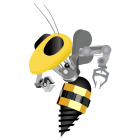 |
GT RoboCup SSL
Soccer software, robot firmware
|
 |
GT RoboCup SSL
Soccer software, robot firmware
|
A composite behavior is one that has 0+ named subbehaviors this class has methods for making it easy to work with and manage subbehaviors. More...
Public Member Functions | |
| def | __init__ |
| def | add_subbehavior |
| def | remove_subbehavior |
| def | has_subbehavior_with_name |
| def | has_subbehaviors (self) |
| def | subbehavior_with_name |
| def | subbehaviors_by_name (self) |
| def | remove_all_subbehaviors (self) |
| def | all_subbehaviors (self) |
| Returns a list of all subbehaviors. | |
| def | all_subbehaviors_completed (self) |
| def | spin (self) |
| Override StateMachine.spin() so we can call spin() on subbehaviors. | |
| def | handle_subbehavior_exception (self, name, exception) |
| Override point for exception handling this is called whenever a subbehavior throws an exception during spin() subclasses of CompositeBehavior can override this to perform custom actions, such as removing the offending subbehavior the default implementation logs the exception and re-raises it. | |
| def | role_requirements (self) |
| returns a tree of role_requirements | |
| def | assign_roles (self, assignments) |
| def | __str__ (self) |
 Public Member Functions inherited from gameplay.behavior.Behavior Public Member Functions inherited from gameplay.behavior.Behavior | |
| def | __init__ |
| def | add_state (self, state, parent_state=None) |
| def | is_done_running (self) |
| def | terminate (self) |
| Transitions the Behavior into a terminal state (either completed or cancelled) | |
| def | behavior_state (self) |
| returns a state in Behavior.State that represents what the behaviors is doing use this instead of the property if you want to avoid dealing with custom subclass substates | |
| def | is_continuous (self) |
| The Behavior's termination behavior noncontinuous: a behavior that accomplishes a specific task, then completes (example: shooting at the goal) continuous: a behavior that continually runs until told to stop (example: zone defense) | |
| def | __str__ (self) |
| def | role_requirements (self) |
| Returns a tree of RoleRequirements keyed by subbehavior reference name This is used by the dynamic role assignment system to intelligently select which robot will run which behavior. | |
| def | assign_roles (self, assignments) |
| assignments is a tree of (RoleRequirements, OurRobot) tuples Same tree structure as the role_requirements() return value, but tuples instead of RoleRequirements as leaf nodes | |
 Public Member Functions inherited from gameplay.fsm.StateMachine Public Member Functions inherited from gameplay.fsm.StateMachine | |
| def | __init__ (self, start_state) |
| def | start_state (self) |
| def | restart (self) |
| Resets the FSM back into the start state. | |
| def | add_state (self, state, parent_state=None) |
| Registers a new state (which can optionally be a substate of an existing state) | |
| def | spin (self) |
| Runs the FSM checks transition conditions for all edges leading away from the current state if one evaluates to true, we transition to it if more than one evaluates to true, we throw a RuntimeError. | |
| def | add_transition |
| def | transition (self, new_state) |
| def | is_in_state (self, state) |
| def | state_is_substate (self, state, possible_parent) |
| def | corresponding_ancestor_state (self, ancestors) |
| def | ancestors_of_state (self, state) |
| def | as_graphviz (self) |
| def | write_diagram_png |
| def | state (self) |
A composite behavior is one that has 0+ named subbehaviors this class has methods for making it easy to work with and manage subbehaviors.
 Inheritance diagram for gameplay.composite_behavior.CompositeBehavior:
Inheritance diagram for gameplay.composite_behavior.CompositeBehavior: Collaboration diagram for gameplay.composite_behavior.CompositeBehavior:
Collaboration diagram for gameplay.composite_behavior.CompositeBehavior: